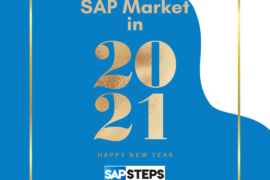Introduction
SAP is a well-known word nowadays, mainly in the business world.
SAP (pronounced S-A-P) is a German management software (ERP) company that was founded in 1972 in the city of Walldorf, Germany.
The acronym SAP itself stands for Systemanalyse Programmentwicklung (German), which means System of Analysis and Program Development.
At the time the company was founded, it had only 5 employees and today (in the year 2020) SAP is present globally in more than 180 countries, has more than 100 thousand employees, and serves more than 440 thousand customers.
The company is a tremendous success.
What does the SAP system do?
SAP created a business management system (ERP) called SAP.
This system is responsible for integrating practically all areas of a company within a single system:
- Human Resources
- Procurement
- Planning
- Inventory control
- Sales
- Production
- Accounting
- Costs
- Quality Management
- Transportation
- Warehouse management
Also, the SAP system allows several companies in the same group (around the world) to be integrated within the same system, which provides business administrators with a virtually real-time view of everything that happens to the business.
Main advantages of the SAP system
Among the main advantages of using an SAP system, we can highlight:
- Full integration of all areas of the company
- Standardization of processes between all branches (including abroad)
- Quick and easy access to company information from anywhere in the world
- Accounting transparency (one of the strongest points in my opinion)
- Information integrity (data is extremely difficult and costly to circumvent)
- Process automation (mainly with the entry of the S / 4Hana version
- Among many others.
Main SAP Modules
Due to the wide range of resources made available by the SAP system, the system was intelligently “divided” into modules.
A module is nothing more than a specific area within the system, as we can see below:
- SD Module (Responsible for sales and distribution)
- MM Module (Responsible for materials and purchasing management)
- FI Module (Responsible for accounting)
- CO Module (Responsible for costs)
- WM module (Responsible for warehouse management)
- PP Module (Responsible for production processes)
- QM Module (Responsible for managing quality processes)
- ABAP module (SAP system development language)
In addition to the modules above, there are several other modules available (I will go into the details of each one later, explaining in more detail the function of each one within the system).
When we think about an SAP project, there is usually a specialist SAP consultant for each module, precisely to facilitate the process of understanding the current processes and adapting each process to the standard proposed by the SAP system.
SAP Market Size
Today, several companies act as management software (ERP) providers globally.
But SAP has for many years been an absolute leader among the richest companies on the globe.
In all my time as an SAP consultant, I rarely heard that a company was switching from an SAP system to a competitor, it is usually the other way around.
In my view, due to SAP’s quality and innovation power, the tendency is for SAP to consolidate itself more and more as the main company in this segment, mainly due to the indisputable quality of the system.
SAP Career
Without a shadow of a doubt, I can say that the SAP career is a great career.
It provides many opportunities for personal and professional growth and also offers extremely competitive remuneration.
But not everything is perfect.
Getting started in the SAP career is not a very easy task, because especially in times when the economy is not expanding much, opportunities for beginners are very scarce.
When I started my career, I started an SAP academy and quickly got a position on a project for a multinational company, but this was mainly due to my second fluent language.
As I have commented several times on SAP Steps, SAP is an extremely globalized career, so to be successful it is very important to have a great focus on a second language (mainly English).
Conclusion
I hope you enjoyed getting to know the SAP world a little more deeply. In the next posts, I will go a little deeper into this incredible world and try to pass on some important information to you.
If you liked this post, be sure to subscribe to our newsletter to receive first hand the next posts and share this post with your friends.
If you have any suggestions (including subjects you would like to read about), feel free to send an email to sapsteps@sapsteps.com.
A big hug,
Bruno César



